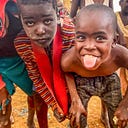Cash grants help women IDPs start new businesses after COVID
Funding from the Government of Japan provides US$10,000 grants and training to 5 small businesses run by internally displaced people, many of whom have been forced to move by climate change
For Farduus, life was hard enough even before COVID-19 arrived in Somalia in March 2020. Years before, she had been a goat farmer in a rural area, but after losing all of her livestock to drought, Farduus was forced to move with her children into the Digaale camp for internally displaced people near Hargeisa. Here, in a village of tents and basic facilities, she joined almost 1,000 other families, many of which had also been forced to migrate after losing farms and animals to the extreme weather conditions that climate change is making more common.
“We were proud pastoralists,” she explains, “and now we had to struggle with life in a camp.”
Always determined to make the best of things, Farduus used her few savings to set up a small kiosk selling everyday items to fellow camp residents. She was doing OK until the pandemic came and then she almost lost everything.
Remittances stopped coming from abroad, livestock farmers couldn’t export their animals; businesses suffered from a period of lockdown. Suddenly no one had money to spend and the effect on small businesses’s like Farduus’s with slim profit margins and limited capital to fall back on when sales slump was considerable.
“When COVID-19 broke out, the business almost collapsed,” she recalls.
So Farduus was a natural choice for a new project set up with funding from the Government of Japan to provide cash grants to vulnerable people who wanted to set up new businesses in the wake of COVID-19.
Farduus joined a collective of 10 camp residents who were given business training and asked to develop an idea that could be kicked off with a US$10,000 grant.
Naturally, Farduus’s group chose goat farming and invested the grant in animals, fodder and equipment.
“Goat sales are always high,” she explains. They’re exported and also consumed widely inside the country. After we sell them, we share the profits among ourselves and maintain the capital to buy more goats.”
In total, there are five such groups. Sacda is in another. Like Farduus, she lost her livestock to drought and wound up in Digaale camp when she had nowhere else to turn. Now she’s focussed on the future, with a new herd and roaring sales.
“We’ve never lost money, says Sacda. “Our ambitions are very high and we hope that our business moves forward!”
Japanese funding has made it possible to start five small businesses, each with 10 people. The work is part of a US$1.2 million grant from the Japanese Government to help address the socio-economic fallout from the COVID-19 pandemic. This includes delivering masks, soap and other supplies, training local youth and vulnerable groups for new work opportunities, providing cash grants for internally displaced people to set up new businesses and raising awareness of how to prevent the spread of the virus.
For an overview of our Japanese-funded work see: https://undpsom.medium.com/government-of-japan-helps-somalia-fight-covid-ed0d0b1c2564
